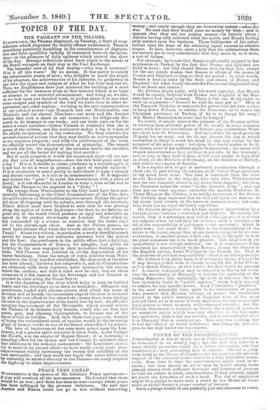TOPICS OF THE DAY.
THE PAGEANT ON THE THAMES.
spearmints, the Thames displayed, on Tuesday, a front of mag- nificence which disguised the deadly offence underneath. There ie something peculiarly humbling in the consciousness of degrada- tion and fetid squalidity lurking ill concealed beneath the splen- dour—in the glimpses of daily ugliness which pierced the show of the day. ,Strange reflections must have arisen to the minds of the Royal voyagers on their way to the Coal Exchange.
The immense cost of all that display—why was it incurred ? Was it all idle waste? By no means. It was partly to satisfy the irrepressible wants of man.; who delights to mark the stages of his progress, the achievements of his industry, by gathering, in one view the.types and ensigns of what he has done and can do. Thus, we Englishmen have just achieved the building of a mart sufficient for the immense trade in that mineral which is so large an element in our material advancement ; and doing so, we like, as we look upon our finished work, to gather about it in one view some ensigns and symbols of the work we have done in other de- partments and other regions : we bring to the spot representatives of our political power—our Monarch and our Municipality, our Ministers and our elected Members—our navy and the foreign navies that seek a share in our commerce; we oblige our Mo- narch to do homage to our trade ; and our trade puts on for the nonce a court costume—Queen Victoria is reminded that she is queen of the colliers, and the coalheaver makes a leg in token of his affable reciprocation in the ceremony. We thus convoke the severed classes of society that they may testify an active sympathy in our common progress ; and with the achievement of the work we officially record the demonstration of sympathy. The record is worth the fee : the dignity of the occasion merits the sacrifice, and we are all the better for making that sacrifice. But if such progress is worth the occasional show—if use me- rits that robe of magnificence—does the rule hold good only for a day ? If it is desirable to clothe, greatness in a suitable garb, is it not bad to let it wear in general a garb of squalid ugliness ? If it is conducive to moral purity in individuals to keep a cleanly and decent exterior, is it mot so in communities ? If it degrades and injures the "gent " to cover his slovenliness with a show of finery, is it not shameful in London to wear a false collar and to bring the Thames to the pageant in a "dicky" ? The voyage from Westminster to the City must have been par- ticularly distressing to the Chief Commissioner of the Fine Arts, the active patron of Metropolitan improvements. Behind the splen- did show of shipping with its colours, seen through the intervals, Prince Albert must have blushed to note that he was passing along the ugliest of water highways—for there is, we believe, no great city in the world which presents ao ugly and miserable an aspect in its central river-banks as London. Most other ci- ties intersected by a stream so contrive that the hanks shall aid in the picturesque effect. And as the Prince passed, he must have noticed that when the vessels stirred up the waters- Faugh I About two o'clock, in particular, a newly dreadful stench spread its unseen but not unknown presence over the waters and the fleet : the gentlemen in the public offices had a holyday, but the Commissioners of Sewers, we imagine, had given no holyday to the men engaged in their periodical flushing opera- tions. Old Thames was revealed in all the degradation of his basest functions. Since the usage of royal journies from West- minster to the City was first established, the character of the river has been altered ; the town has outgrown it, and the Commission- ers aforesaid, with their cognates, quite monopolize the stream below the surface; and thus it must now be said, that on these occasions it is the custom for the Sovereign and her Consort to proceed in state along the Great Sewer. It is this function of the river which helps to keep its builded banks and the dwellings upon them so unsightly. Offensive and pestiferous, loaded with obscene odours that revolt the sense of decency and of health, the immediate edge of the river is shunned by all who can afford to live elsewhere ; hence there is no abiding interest in the improvement of its banks foot by foot. An effective sanatory improvement of the Metropolis, which should relieve the Thames of its hideous daily burden, would also set free that great, gay, and pleasing thoroughfare, to become one of the finest streets in London. And then these vast pageants, instead of being the embroidered cloak of squalor, would be the crowning glory of human works in one of the fairest sites offered by nature.
The love of improvement has once more seized upon the Lon- doners, and a graver spirit animates it since Nash, under George the Fourth, was the creator of Regent Street; it is becoming a standing office for the Queen and her Consort to celebrate these fine additions to the national monuments: the Londoners should try to make it an annual affair—to have ready, every year, some improvement widely increasing the beauty and salubrity of the vast metropolis ; and they could not begin the series better than by restoring its natural decency to the Thames—in many respects the highway to other improvements.


























 Previous page
Previous page